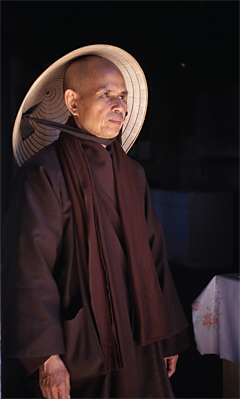
It’s said that no man is a hero to his butler. But it is with the butler’s view that we get a more complete picture of heroic figures in their full humanity.
For those who like their heroes pure, the butler’s unvarnished view may well be unwelcome. But it’s precisely his perspective that throws into high relief what the hero has accomplished despite his human frailty.
In the early 1980s, Thich Nhat Hanh was already known in the United States primarily for his work for peace during the Vietnam War. Although he had published a few books in English, Thay, as his students call him, was not yet widely known here for the teachings that would later exert such a tremendous influence on Buddhism in the West.
In this issue, editor-at-large Andrew Cooper tells a story of his early travels as Thay’s attendant. The picture that emerges in “The Debacle” is a complex—and at times humorously human—picture of a man who brought the teachings to the very people whose country had brought ruin to his own.
It is fair to say that the Buddhism Nhat Hanh found when he arrived in the West was not the same Buddhism that he left behind. According to Cooper, “There are several ways in which Thay changed the map of dharma. For one, his emphasis on dependent origination, a core teaching shared by all schools of Buddhism, has become one of the signal principles of Western Buddhism. If you look at early dharma books published in the U.S. prior to his coming, you’ll see very little reference to it outside of academia. What he did was to use dependent origination as the thread that tied together all traditions, using it to explicate the teachings of the Pali canon, the Mahayana teachings on emptiness, and the Hua-Yen vision of radical interdependence.”
Cooper goes on to point out that while Thich Nhat Hanh was not the only proponent of engaged Buddhism, more than any other single person he was a catalyst for the movement’s growth and acceptance. The importance of this may be difficult to grasp now, but when he appeared on the Western scene there was still a lot of controversy about whether it was the business of Buddhism to engage socially and politically with the culture at large. Nhat Hanh’s strongly nonsectarian view of Buddhism also motivated many to reach out to other communities and traditions at a time when Buddhism in the West was far more parochial. It would not be an exaggeration to say that his inclusive vision laid the groundwork for the flourishing of Buddhist publications, including Tricycle, over the last twenty years. Indeed, he and the current Dalai Lama have been two of the most unifying figures in Western Buddhism. In fact, Thich Nhat Hanh very specifically makes a case for accepting all sutras from all traditions as authentic, rejecting not only exclusive claims to authenticity of the Theravada school but also the hierarchical schematic of Mahayana Buddhism, with its notion of “higher” and “lower” or “greater” or “lesser” teachings. This open vision is revolutionary in Buddhist history and is also in line with modern historical scholarship (see Rita Gross’s “Buddhist History for Buddhist Practitioners”).
The events that Cooper’s narrative describes took place nearly thirty years ago. Today, it is easy to take for granted the changes Thich Nhat Hanh helped to usher in or to see them as inevitable. While attributing them to one man would be a mistake (as Thay himself would say, the “non–Thich Nhat Hanh” elements were equally in play), it is hard to overstate his role. “The Debacle” provides rare and idiosyncratic background to someone who is rightly known to be one of Buddhism’s pivotal figures.
—James Shaheen, Editor and Publisher
Thank you for subscribing to Tricycle! As a nonprofit, we depend on readers like you to keep Buddhist teachings and practices widely available.